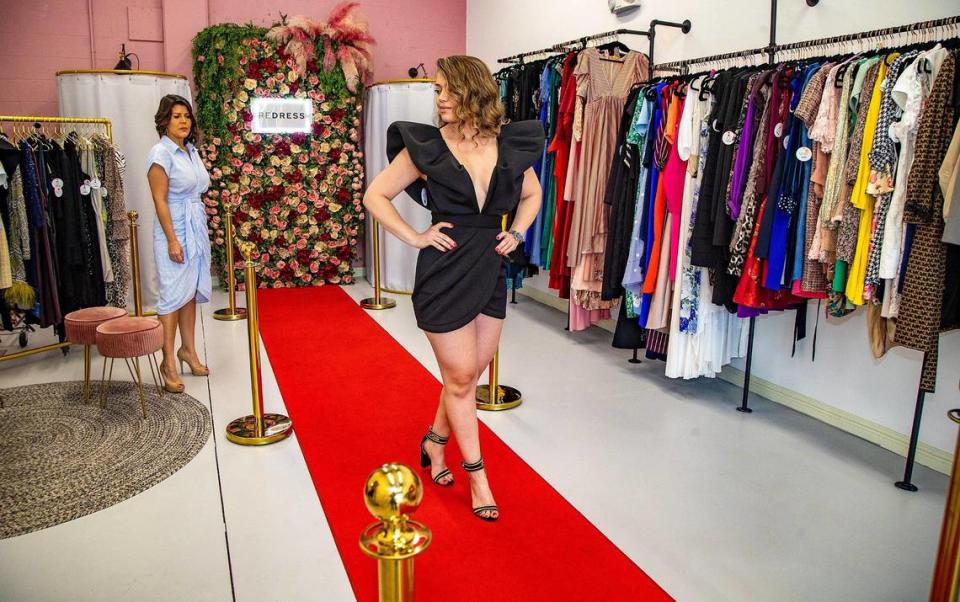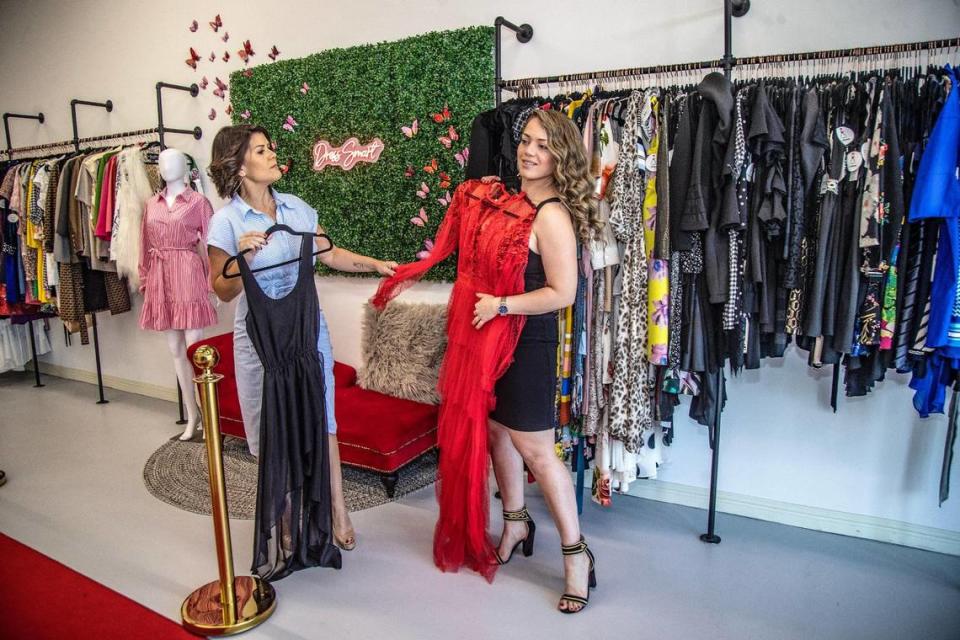Dressing to impress? Miami retail startup offers secondhand shopping with a twist
A women’s clothing store tucked in a Sweetwater strip center on a quiet street near the bustling Dolphin Mall might seem like it offers a run-of-the mill shopping experience.
A lady walked in on a recent day, tried on different outfits before choosing one or two to buy. A sales associate stayed close to her as she considered apparel options. Don’t be fooled, though.
In reality, unique retailing takes place at this store run by online clothing exchange startup Redress. Think the burgeoning circular economy, but more on that later in this small business profile story.
Here’s how this retail enterprise works. Women bring used dresses or jackets to get credits to apply towards the purchase of another dress or jacket in the store. The cost of another lightly worn Zara or Carolina Herrera dress? Anywhere from $15 to the store’s maximum $120.
First launched online last year, shoppers also can skip the store and opt to get their clothing evaluated and exchanged through the company’s digital application or website.
The swapping secondhand shopping business, started here by Miami businesswoman Rossanna Ceccato, is perhaps the first in the region and among the few in the country, retail experts said. Now, the Venezuelan native plans to expand the company’s physical footprint outside Florida.
What prompted her to dive into clothing exchange as a business?
“You have to listen to the market. You have to move with the client,” said Ceccato, CEO and co-founder of Redress. “If we hadn’t listened to the client, we would have been dead in the water.”
The 40-year-old entrepreneur got the idea for Redress after noticing a trend among her clients from earlier retail ventures. Ceccato had owned two apparel boutiques in Miami International Mall in Doral where her customers often complained of lacking clothes for work, company events, weddings, parties or birthdays.
Those women were among her best customers, frequenting her boutiques at least once a month. After often wearing them one time, they’d accumulate dresses in their closets. Ceccato learned they would rather be caught dead than be photographed or seen in the same outfit twice.
Therefore, she decided to start a new business, so those loyal customers she had could bring back those clothes — and unload their closets in the process — and swap them for something else at a lower price rather than buying more brand new dresses to only wear once or twice.
By March 2022, Ceccato, her husband Matias Hercovich and friend Alfredo Ferrari, the director of operations, started the company. She was so smitten with the Redress business plan she tattooed the company logo — an A-line-style dress with the hem framed by the universal recycling symbol and date 03. 03. 2022 on her left wrist.
Started with an app
The app and website launched online last July, with an inventory of 40 pieces clothing, all donations from friends. From there, operations started by customers snapping pictures of the apparel they wanted to turn in, uploading them on the Redress digital platform and waiting for approval from Ceccato or one of her two employees.
The pieces get evaluated for wear and tear, as well as brand name on the labels. If accepted, shoppers get credits toward exchanging to buy lightly used clothing in the Redress inventory. After purchasing online or via the app, customers get their new dresses and other apparel delivered in a Candy Apple Red package with another, prepaid and labeled envelope to mail their used clothing to the store. Redress routinely rejects items from Shein, Fashion Nova, H&M and Forever 21.
By November, Ceccato and her retailing team opened the brick-and-mortar site in Sweetwater to house their growing inventory and allow shoppers to have the clothes swapping experience in person. Ceccato chose the location for its proximity to her Doral home. Today, that store at 10890 NW 17th St. carries about 1,000 dresses and jackets.
The company has made $66,000 in profit so far from 5,000 apparel-exchange transactions. She has competed in startup competitions, including becoming a finalist at this year’s Miami Herald’s Startup Pitch Competition, to gain more business skills and hopefully land financing commitments, to help her scale the company. Ceccato now has a staff that includes three sales representatives and stylists.

The majority of Redress customers come from Miami area, shopping both online and in the store. The firm’s biggest pool of clients are bankers, financial advisors, sales representatives and real estate agents like 30-year-old Grecia Colmenares. For these women who have a schedule packed with events and in-person meetings, Redress has become a saving grace to find a new outfit at a budget-friendly price.
“I’m always at events and need to look good,” Colmenares said, as she shopped one morning at Redress. “This helps me dress well and care for my wallet.”
Redress also has a wide reach across the country and Puerto Rico. After Miami, most other online buyers come from New York.
Circular economy
Ceccato entered the retailing scene at the perfect time, said Carolina Obregón, a sustainable fashion expert and adjunct faculty at Parsons School of Design in New York City. Redress joins the booming circular economy.
The industry came about with the publication of Michael Braungart and William McDonough’s book “Cradle to Cradle: Remaking the Way We Make Things” in 2002. The book highlighted how all products should follow a circular fashion of reuse, reduce and recycle. The Ellen MacArthur Foundation, established in 2010, based itself on the key tenets of the book and promoted innovation to strengthen and improve the circular economy.
“The other thing that is important with the circular economy is that it is trying to deter our throwaway culture,” Obregón said. “The idea of recycling and reusing is really a gateway for us to understand that clothing shouldn’t be discarded so easily.”
More shoppers are embracing reused clothing, especially those in generations X and Z, meaning they were born between 1965 and 1980 and between 1997 and 2012, respectively.
Obregón and Beth Azor, a retail expert and founder of Weston-based Azor Advisory Services, said they’ve never heard or seen a sustainable fashion business model like that of Redress. However, Obregón said, the swapping concept has origins in Europe. In 2013, English brand Swap-O-Rama hosted parties where guests would bring clothes to exchange with one another.
“She has tapped an area that after the pandemic we feel like we want to be out there and touch things and feel things,” Obregón said. “She’s tapping into something emotional. It’s not only about the clothing. It’s about something grander. It’s being part of that change.”
Click-to-bricks brands like Redress are growing in numbers, Azor said, because more shoppers want to buy some items like clothing and accessories in person.

On to the Big Apple
Today, the biggest competitors in this clothing exchange space are the San Francisco-based The RealReal and Rent the Runway of New York City. For Ceccato, these companies represent her main rivals and metrics for growth.
Redress already faces its next frontier, nearly a year after its launch. Ceccato plans to open a second store in New York City by late this year. She said she wants to tap into the growing interest she’s seen from online buyers in the Big Apple. She doesn’t fear the quick expansion into an infamously competitive market, seeing that she’s already faced hurdles in Miami.
“Latin women are more picky (about secondhand clothing),” Ceccato said. “Americans are more open to used clothing.”

